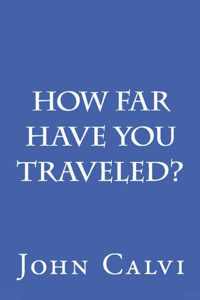How Far Have You Traveled?
Reviewed by Bob Dixon-Kolar
March 1, 2020
 By John Calvi. True Quaker Press, 2019. 236 pages. $14.95/paperback.
By John Calvi. True Quaker Press, 2019. 236 pages. $14.95/paperback.
Buy from QuakerBooks
Quaker healer and teacher John Calvi has published two books: The Dance Between Hope and Fear (2013) and How Far Have You Traveled? (2019). Both are compilations of writings drawn from his presentations and speeches at Quaker gatherings; from his articles for Friends Journal; and from his private journals, poems, and song lyrics. He credits his editor, Shelly Angel, for her indispensable role in selecting from among his many writings, sequencing them, and shaping the overall form of the books. In The Dance Between Hope and Fear, Calvi chronicles his work of more than 30 years helping people who suffer from physical and psychological trauma. He also gives insight and guidance to others who engage in what he terms “compassionate work.”
How Far Have You Traveled?—a wise, arresting book—addresses these matters, too, but focuses more on how dedicated people manage to keep up their loving service, year after year, without burning out. Calvi states in his introduction: “The core of this book is about goodness and knowing your goodness.” This realization “offers strength and balance for hard work, specifically the hard work of healing one’s self and others.”
The book’s title is taken from a 2003 talk Calvi gave at a Midwinter Gathering of Friends for Lesbian and Gay Concerns. He tells his audience that the question “How far have you traveled?” is a traditional Tibetan greeting. It invites people to share openly about what they have experienced on their journeys. One message of Calvi’s book is that retrospection upon one’s life journey is important. As Calvi says, “Seeking how things become is great work.” To look back honestly and without self-judgment upon the key events and people in our lives is to discern patterns. Making sense of these patterns can give direction to our personal and spiritual development—can aid in our becoming.
Over the course of his divine ministry, Calvi, a certified massage therapist, has surrendered to and channeled his healing energy to hundreds of suffering people, including women who have been sexually abused, survivors of torture, and people living with AIDS. Under the care of his hands, many have experienced the liberating release of their pain. Calvi writes that as a youth, he too had been hurt deeply and that his own healing has been slow and difficult. He points out that even for the people he helps—however dramatic their deliverance—full healing is often a long-term process, not a one-time event.
Calvi is an engaging storyteller; frequently eloquent; and often quite funny, even when discussing difficult and weighty matters. But I value him most for his wisdom, grounded in long experience and sensitive reflection. Consider this one insight among the many in his book: “Quakerism is essentially a somatic religion. Messages come through the body, and we vibrate within our bodies, and use the Light and use our bodies in the work.”
His book is full of examples of intimate human-to-human contact. He tells of an old Quaker woman who saw a young man, a prison inmate serving a long sentence for murder, weeping in remorse and despair. She “just scooped him up and held him and rocked him until he was finished weeping.” Calvi tells of being at an event where he overheard a woman talking with a friend about a bad pain in her back. His hands, he says, “began to heat up,” and an inward message told him of the exact location of her pain. He knew that if he were “permitted to touch her, [he] could release that pain.” An opportunity came for him to offer his help, and she received his healing touch in trust and gratitude.
Calvi, in his dance between hope and fear, goes directly to the point of need. In the early days of the AIDS crisis, when there was much panic and little understanding of the nature of HIV and its transmission, Calvi set his hands to work, when few other massage therapists were willing to do so. Of his encounter with one very ill person, he writes, “I was trying to be graceful, but was afraid that I was going to get sick too. I was afraid that this fellow was going to die before we could reach a moment of beautiful compassion.”
This poignant statement reminds me of lines from a poem by Thom Gunn. The speaker in the poem addresses a man whose friend, stricken with AIDS, lies in a hospital bed, coughing, shivering, frightened:
And you perceived that he
Had to be comforted,
You climbed in there beside him
And hugged him plain in view,
Though you were sick enough,
And had your own fears too.
Whatever our spiritual gifts may be, let us cultivate them and take them to the places where they are needed. In my favorite of his published talks, titled “Schlepping the Light,” Calvi sums up a lesson he learned from a Friend: “Don’t just say you’re going to do your spiritual life, show up and do it.”


